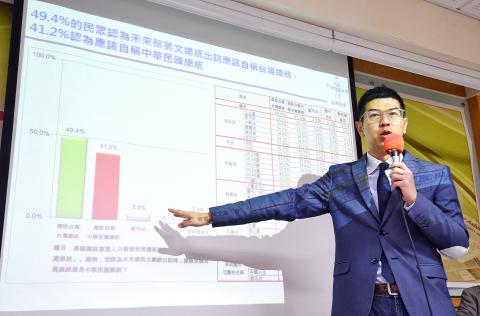About half of Taiwanese said President Tsai Ing-wen (蔡英文) should refer to herself as “the president of Taiwan” while visiting the nation’s diplomatic allies, marking a rise in Taiwanese identification, according to a poll released by the Taiwan Thinktank yesterday.
According to the poll, 49.4 percent of respondents said Tsai should introduce herself as the president of Taiwan — up from 39.8 percent in a May poll by the think tank — while 41.2 percent said she should refer to herself as the president of the Republic of China (ROC) — down from 44.7 percent in May.
Fifty-one percent of respondents said the nation should use “Taiwan” as its official title when participating in international events, while 34.6 percent preferred “the Republic of China” and 9 percent preferred “Chinese Taipei.”

Photo: Liu Hsin-de, Taipei Times
When asked whether diplomatic missions in Taiwan should be identified as “representatives to Taiwan,” as was the case during the administration of former president Chen Shui-bian (陳水扁), or as “representatives to [the Republic of] China,” which has been the case since former president Ma Ying-jeou’s (馬英九) administration, 55.9 percent of respondents said the missions should be referred to as “representatives to Taiwan,” while 26.8 percent said they should be referred to as “representatives to China.”
In terms of Taiwan’s representative offices in other nations — usually called Taipei Economic and Cultural Offices — 66.7 percent of respondents said they should be renamed as “Taiwan representative office,” while 22.14 percent said renaming is unnecessary.
“The poll results suggest a rise in Taiwanese identification especially among young people, with public identification with the ROC on the decline,” Democratic Progressive Party (DPP) Legislator Lee Chun-yi (李俊俋) said.
“The poll shows a stronger public sentiment toward changing the official name of the nation,” New Power Party Legislator Hsu Yung-ming (徐永明) said.
However, the terms “Taiwan” and the “ROC” are not mutually exclusive, as Chen and Ma had used the terms interchangeably, Hsu said.
When the respondents were asked which nation they regarded as the most important to develop close relations with, 42.1 percent said the US, 25.8 percent said China and 13.7 percent said Japan.
In the poll conducted by the think tank in May, 55.6 percent of respondents favored developing close ties with the US, 19.1 percent chose Japan and 15.7 percent preferred China.
The decrease in the number of people favoring stronger Taiwan-US ties might be caused by possible anxiety over deteriorating cross-strait ties, while young respondents aged between 20 and 29 show an evident preference for Japan, Taiwan Thinktank deputy executive director Lai I-chung (賴怡忠) said.
Regarding the controversial participation of retired military officers at a Chinese Communist Party event last month, 73.8 percent of respondents said it is inappropriate for former military officials to engage in political activities in China, while 16.6 percent said it is appropriate.
According to the poll, 73.9 percent said they support the establishment of a legal framework regulating retired military officials’ visits to China, while 16.9 percent said they oppose it.
The poll, which was conducted between Monday and Tuesday last week and collected 1,072 valid samples, has a confidence level of 95 percent and a margin of error of 3 percentage points.

Taiwanese can file complaints with the Tourism Administration to report travel agencies if their activities caused termination of a person’s citizenship, Mainland Affairs Council Minister Chiu Chui-cheng (邱垂正) said yesterday, after a podcaster highlighted a case in which a person’s citizenship was canceled for receiving a single-use Chinese passport to enter Russia. The council is aware of incidents in which people who signed up through Chinese travel agencies for tours of Russia were told they could obtain Russian visas and fast-track border clearance, Chiu told reporters on the sidelines of an event in Taipei. However, the travel agencies actually applied

New measures aimed at making Taiwan more attractive to foreign professionals came into effect this month, the National Development Council said yesterday. Among the changes, international students at Taiwanese universities would be able to work in Taiwan without a work permit in the two years after they graduate, explainer materials provided by the council said. In addition, foreign nationals who graduated from one of the world’s top 200 universities within the past five years can also apply for a two-year open work permit. Previously, those graduates would have needed to apply for a work permit using point-based criteria or have a Taiwanese company

The Shilin District Prosecutors’ Office yesterday indicted two Taiwanese and issued a wanted notice for Pete Liu (劉作虎), founder of Shenzhen-based smartphone manufacturer OnePlus Technology Co (萬普拉斯科技), for allegedly contravening the Act Governing Relations Between the People of the Taiwan Area and the Mainland Area (臺灣地區與大陸地區人民關係條例) by poaching 70 engineers in Taiwan. Liu allegedly traveled to Taiwan at the end of 2014 and met with a Taiwanese man surnamed Lin (林) to discuss establishing a mobile software research and development (R&D) team in Taiwan, prosecutors said. Without approval from the government, Lin, following Liu’s instructions, recruited more than 70 software

Taiwanese singer Jay Chou (周杰倫) plans to take to the courts of the Australian Open for the first time as a competitor in the high-stakes 1 Point Slam. The Australian Open yesterday afternoon announced the news on its official Instagram account, welcoming Chou — who celebrates his 47th birthday on Sunday — to the star-studded lineup of the tournament’s signature warm-up event. “From being the King of Mandarin Pop filling stadiums with his music to being Kato from The Green Hornet and now shifting focus to being a dedicated tennis player — welcome @jaychou to the 1 Point Slam and #AusOpen,” the